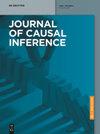估计广义平均处理效果的最优加权
IF 1.7
4区 医学
Q2 MATHEMATICS, INTERDISCIPLINARY APPLICATIONS
引用次数: 5
摘要
在因果推理中,研究了各种因果效应估计,包括样本、未删减、目标、条件、最优亚群和最优加权平均处理效应。基于逆概率加权(IPW)和结果回归建模,已经为每个估计开发了特别的方法,但这些方法可能对模型错误规范、实际违反正性或两者都很敏感。这篇文章的贡献是双重的。首先,我们制定了广义平均处理效应(GATE)来统一这些因果估计及其IPW估计。其次,我们开发了一种基于核最优匹配(KOM)的方法来最优估计GATE,并找到最容易被KOM估计的GATE,我们称之为核最优加权平均处理效果。KOM在控制精度的同时,对一类模型上加权估计器的条件均方误差提供统一的控制。我们研究了它的理论性质,并在仿真研究中评价了它的比较性能。我们在两个案例研究中说明了KOM对GATE估计的使用:比较脊柱外科干预和研究同伴支持对艾滋病毒感染者的影响。本文章由计算机程序翻译,如有差异,请以英文原文为准。
Optimal weighting for estimating generalized average treatment effects
Abstract In causal inference, a variety of causal effect estimands have been studied, including the sample, uncensored, target, conditional, optimal subpopulation, and optimal weighted average treatment effects. Ad hoc methods have been developed for each estimand based on inverse probability weighting (IPW) and on outcome regression modeling, but these may be sensitive to model misspecification, practical violations of positivity, or both. The contribution of this article is twofold. First, we formulate the generalized average treatment effect (GATE) to unify these causal estimands as well as their IPW estimates. Second, we develop a method based on Kernel optimal matching (KOM) to optimally estimate GATE and to find the GATE most easily estimable by KOM, which we term the Kernel optimal weighted average treatment effect. KOM provides uniform control on the conditional mean squared error of a weighted estimator over a class of models while simultaneously controlling for precision. We study its theoretical properties and evaluate its comparative performance in a simulation study. We illustrate the use of KOM for GATE estimation in two case studies: comparing spine surgical interventions and studying the effect of peer support on people living with HIV.
求助全文
通过发布文献求助,成功后即可免费获取论文全文。
去求助
来源期刊

Journal of Causal Inference
Decision Sciences-Statistics, Probability and Uncertainty
CiteScore
1.90
自引率
14.30%
发文量
15
审稿时长
86 weeks
期刊介绍:
Journal of Causal Inference (JCI) publishes papers on theoretical and applied causal research across the range of academic disciplines that use quantitative tools to study causality.
 求助内容:
求助内容: 应助结果提醒方式:
应助结果提醒方式:


